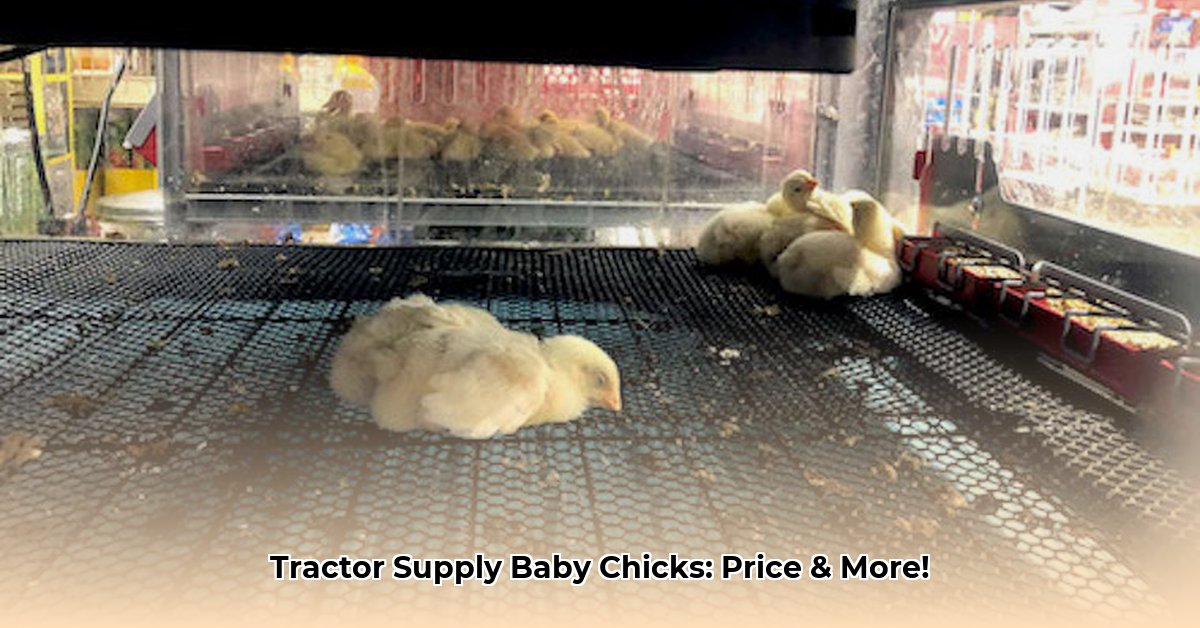
Want fresh, farm-fresh eggs without the farm? Raising backyard chickens is a rewarding experience, but understanding the costs is crucial. This guide provides a comprehensive look at purchasing baby chicks from Tractor Supply, covering initial expenses, ongoing costs, and sustainable practices to ensure your flock thrives ethically and economically. For more on chicken coops, check out this helpful resource: Chicken Coop Guide.
The Price of Baby Chicks at Tractor Supply: A Variable Equation
The cost of baby chicks isn't a single number; it varies considerably. Several factors influence the final price tag:
- Breed: Popular breeds like Rhode Island Reds or White Leghorns are generally cheaper than rarer heritage breeds.
- Age: Younger chicks are usually less expensive than older, almost-laying hens.
- Season: Spring's high demand often leads to higher prices than the fall.
- Supply and Demand: Like any market commodity, chick prices fluctuate based on availability.
Expect to pay anywhere from $2 to $10 per chick, though prices may vary depending on your location and the current market conditions. Checking Tractor Supply's website or your local store for the most up-to-date pricing is always recommended. Does the potential reward of fresh eggs justify the initial investment? Let's explore further.
Essential Supplies and Setup Costs: Building Your Chick's Habitat
Bringing home your chicks is just the start; you'll need a safe, comfortable brooder (their temporary home). A basic kit (box, heat lamp) typically costs between $30 and $100, depending on size and features. Larger brooders are beneficial for larger flocks. Beyond the brooder, you'll need:
- Feeders and Waterers: Approximately $10-$25
- Bedding (pine shavings): $5-$15
- Heat Lamp: $15-$30 (LED options are more energy-efficient)
- Thermometer: Essential for temperature regulation.
These items are readily available at Tractor Supply and similar retailers. Anticipate an initial supply cost ranging from $50 to $150, depending on your setup and the number of chicks you plan to raise. Is investing in quality equipment worth the long-term benefits of happy, healthy chickens?
Ongoing Costs: The Long-Term Commitment
Raising chickens is a commitment, not a temporary hobby. Expect ongoing expenses, including:
- Feed: $5-$10 per chick per month (prices vary by age, breed, and feed type. Organic feed is usually more expensive). Transitioning to different feeds as your birds mature will also impact the cost.
- Veterinary Care: Budget for potential health issues. Preventive care is key to minimize future costs.
- Coop Maintenance: Once your chicks are in a coop, factor in cleaning supplies and maintenance.
These are estimates. Actual costs depend on flock size, breed, and unforeseen events. Planning for these recurring expenses is essential for long-term financial sustainability. How can you balance these costs against the potential income from eggs or meat?
Sustainable Practices: Ethical and Environmental Responsibility
Sustainable practices benefit both your chickens and the planet:
- Breed Selection: Choose hardy, disease-resistant breeds suited to your climate. This minimizes veterinary expenses and environmental impact.
- Ethical Sourcing: Support farms prioritizing humane treatment. Tractor Supply often partners with responsible breeders.
- Waste Management: Composting chicken manure reduces waste and produces valuable fertilizer.
- Predator Control: Implement humane and effective predator control methods.
Sustainable practices are an investment in the long-term health and viability of your flock. Are you prioritizing the ethical and environmental aspects of your backyard poultry farming operation?
Long-Term Sustainability and Economic Viability: Profit or Pleasure?
While chickens offer fresh eggs, and potentially meat, profitability depends on several factors:
- Initial Investment: The start-up costs are significant.
- Ongoing Expenses: Feed and potential vet bills are continuous costs.
- Market Demand: Selling surplus eggs or meat can offset expenses, but market research is crucial.
Raising chickens can be a satisfying, sustainable food source, but it's essential to have realistic expectations about potential financial returns.
Legal and Regulatory Considerations: Knowing the Local Rules
Before purchasing chicks, check your local ordinances. Many areas have regulations regarding backyard poultry keeping, including flock size, coop requirements, and waste management. Understanding these rules is essential to avoid legal issues.
Conclusion: A Clucky Investment
Raising chickens is more than just acquiring baby chicks from Tractor Supply; it involves careful planning, a long-term investment, and a commitment to responsible animal husbandry. While the initial cost and ongoing expenses are important, the rewards – fresh eggs, potentially meat production, and a deeper connection to where your food comes from – often outweigh the challenges. By understanding the costs and integrating sustainable practices, you can embark on a fulfilling and potentially profitable backyard farming adventure.